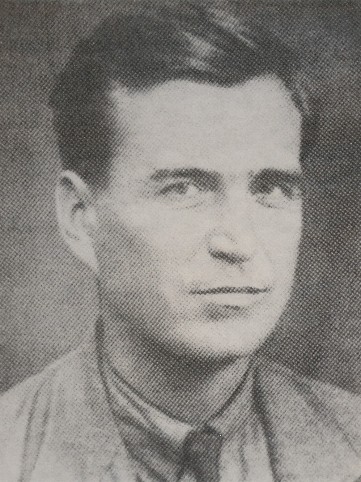Osmachka, Teodosii
Osmachka, Teodosii or Todos [Осьмачка, Теодосій or Тодось; Os'mačka, Teodosij or Todos'], b 3 May 1895 in the village of Kutsivka, Cherkasy county, Kyiv gubernia, d 7 September 1962 in Long Island, New York State. Poet, novelist, and translator. Although his first poems were written in 1916, Osmachka began his literary career while he was a student at the Kyiv Institute of People's Education from 1920 to 1923. He belonged to the literary organizations Aspys and Lanka (see MARS), and published his first collection of poetry, Krucha (The Precipice), in 1922; it was followed by two more collections, Skyts’ki vohni (The Scythian Fires, 1925) and Klekit ([Crane’s] Clacking, 1929). Like other members of MARS he was attacked and arrested for his ‘unpolitical’ literary works, but managed to save himself from execution by feigning insanity. During the 1930s he faced constant persecution by the authorities and was unable to publish any works. During the Second World War he fled to Western Ukraine, then to displaced persons camps in Germany, and finally to the United States. Osmachka’s personal ordeal had lasting effects on him, and until his death he suffered from a persecution complex. Nonetheless he resumed his literary career in 1943 in Lviv with the publication of his fourth collection of poetry, Suchasnykam (To My Contemporaries). In the displaced persons camps, where he was a member of the MUR literary organization, he published his epic poem, written in octaves, Poet (Poet, 1946), as well as his first prose work, Starshyi boiaryn (The Best Man, 1946). Kytytsi chasu (Bouquets of Time, 1953) and selected poems published as Iz-pid svitu: poetychni tvory (From under the World: Poetic Works, 1954) completed his poetic oeuvre, which is characterized by expressionistic imagery, frequent dumalike (see Duma) rhythms, and a ponderous tone. In his later prose Osmachka devoted himself to the portrayal of the meticulously planned genocidal destruction of Ukraine by the Soviet regime. Plan do dvoru (Annihilation, 1951) deals with the liquidation of the independent Ukrainian farmer, and Osmachka’s most famous and powerful autobiographical work, Rotonda dushohubtsiv (The Rotunda of Assassins, 1956; published in English as Red Assassins, 1959), describes the destructive state—a machine for spiritual and physical annihilation—and shows that often the individual’s only avenues of escape are death or madness. Besides some poems of Byron Osmachka translated Oscar Wilde’s The Ballad of Reading Gaol (1958) and William Shakespeare’s Macbeth and Henry IV (1961). The first edition of Osmachka’s selected poems in post-Soviet Ukraine appeared in Kyiv in 1991 and it was followed by a number of other editions of his poetry and prose. A biography of Osmachka by Mykhailo Slaboshpytsky appeared in 1995 and a literary study by Nila Zborovska was published in 1996.
Danylo Husar Struk
[This article was updated in 2007.]

%20members%201920s.jpg)
.jpg)
